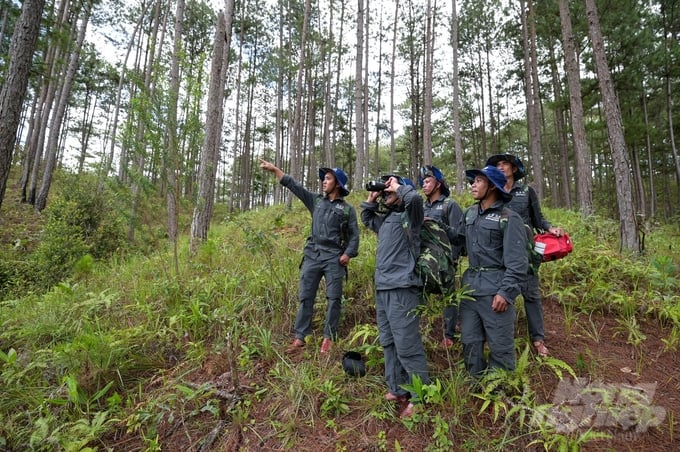May 24, 2025 | 16:21 GMT +7
May 24, 2025 | 16:21 GMT +7
Hotline: 0913.378.918
May 24, 2025 | 16:21 GMT +7
Hotline: 0913.378.918

The theme for International Day of Forests 2024 is Forests and Innovation: New Solutions for a Better World.
Forests are a stabilizing force for life on this planet.
Covering around one-third of all land on Earth, they regulate ecosystems, protect biodiversity, support livelihoods in rural communities and can help drive sustainable development.
Forests are also home to most of earth’s terrestrial biodiversity. They supply water, provide livelihoods, mitigate climate change and are essential for sustainable food production.
Yet deforestation and forest degradation continue to take place at alarming rates. We must take bold actions to reverse the loss of forests and their biodiversity for the benefit of current and future generations. This is a call to action for every individual and country, including Viet Nam.
To underline the need for action, this year’s theme for International Day of Forests 2024 is Forests and Innovation: New Solutions for a Better World. The importance of forests to our future is why the United Nations General Assembly, in 2012, proclaimed 21 March as the International Day of Forests to celebrate and raise awareness of the importance of this renewable resource.
This year’s theme is highly relevant to us all. Though the rate of deforestation has decreased over the past three decades, more than 420 million hectares of forest have vanished globally since 1990. With 10 million hectares lost annually due to deforestation and approximately 70 million hectares affected by fires, the battle against deforestation requires new technological advancements. These innovations are essential for early warning systems, sustainable commodity production, and empowering people through land mapping and climate finance access.
In simple terms, reducing deforestation and forest degradation, in step with restoring and sustainably managing forests, are critical pathways to help achieve the 2030 Sustainable Development Goals.
That is why the Food and Agriculture Organization (FAO) is a committed partner of Viet Nam, in particular the Ministry of Agriculture and Rural Development, to embed a range of innovative technologies into the country’s forestry sector. This includes establishing a monitoring and evaluation system for forest resources, with the application of remote sensing technology, geographic information systems, information technology in forestry industry management, mapping and securing customary land. These efforts will help empower local rural communities and ethnic minorities. By 2030, this work by FAO and local partners will see 100 percent of forest owner organizations capable of monitoring, supervising, managing forest resources, and preventing and fighting forest fires based on science and technology.
FAO is also helping Viet Nam tune into the digital transformation revolution by diversifying revenue sources from forests, such as carbon credit transactions through the upcoming FAO-backed lowering missions by accelerating forest finance (LEAF) Reduction Programme, plus technical support of the Payment for Forest Environmental Services initiative. With Viet Nam one of the world’s largest wood and wood product exporters, ranking fifth globally and first in Southeast Asia, FAO is helping push the boundaries of sustainable wood products. Additionally, through ecosystem restoration, including reforestation efforts, we are boosting climate mitigation efforts and enhance food security in vulnerable communities.
These innovations taking root in Viet Nam’s forestry sector are inspiring and set a solid foundation for further initiatives to ensure this critical renewable resource is able to continuing replenishing itself and remain a force for life on this planet.
In the words of FAO Director-General Dr QU Dongyu, “let us build a green, healthy and resilient future with forests, for all-live in a city with forests and in a village surrounded by forests”.
FAO Representative in Vietnam

(VAN) In the tranquil wetlands of Van Long, there are quiet souls who guard the forests, nurture the waters, and oversee every bird and troop of langurs as protecting the essence of a living heritage.

(VAN) WWF, GIZ, IUCN, UNDP call for biodiversity conservation and sustainable development must be regarded as a unity in strategies for a green future.

(VAN) On celebration of International Day for Biological Diversity, Deputy Minister Nguyen Quoc Tri called for practical actions to address nature and biodiversity conservation.

(VAN) Dr. Hoang Thi Thanh Nhan – Deputy Director of the Nature and Biodiversity Conservation Agency – highlighted this on the International Day for Biological Diversity, May 22, 2025.
![Ho Chi Minh city adapts to climate change: [2] Accelerating action](https://t.ex-cdn.com/nongnghiepmoitruong.vn/608w/files/chiqk/2025/05/22/4024-4220-bien-doi-khi-hau-1-100626_766.jpg)
(VAN) Clearly recognizing the challenges posed by climate change, Ho Chi Minh city has swiftly shaped its policies and implemented practical solutions to adapt.

(VAN) Rice straw is no longer just a discarded byproduct, but it is becoming a green resource that helps farmers in the Mekong Delta reduce emissions and promote circular, sustainable agriculture.

(VAN) Other Effective Area-based Conservation Measures (OECMs) are solutions that contribute effectively to achieving the goals of the Kunming–Montreal Global Biodiversity Framework.